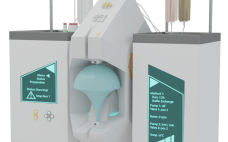Orgenesis and Johns Hopkins University will build a cell and gene therapy processing facility in Maryland, US for point of care treatment. The 7,000 square-foot POCare Center, also known as the Maryland Center for Cell Therapy Manufacturing, has been partly funded by a $5 million grant from the State of Maryland with building expected to start in Q2 2022 and the facility anticipated to be operational by Q2 2023. “Orgenesis is a pioneer of decentralized processing and production of CGTs,…
Monday, January 24, 2022 Daily Archives
Samsung Bio buoyed by COVID, citing mRNA and mAbs as drivers
Samsung Biologics says COVID-19 related demand drove growth in 2021 and predicts mRNA business will be key this year. The Korean contract development and manufacturing organization (CDMO) saw revenue of KRW444.3 billion ($328 million) in the fourth quarter of 2021, up 18% on the comparable period in 2020.  Profits increase 39% to KRW128.8 billion. For the full year revenue and operating profit grew 35% and 84%, respectively. Samsung also said its fourth quarter operating margin jumped 29% due to increased utilization across all…
Continuous processing and CGTs: MilliporeSigma on CDMO trends for 2022
BioProcess Insider spoke virtually with MilliporeSigma’s head of Process Solutions Andrew Bulpin about his predictions for the company and the CDMO space in 2022. The life sciences services division of Merck KGaA, MilliporeSigma, has been steadily increasing its contract development manufacturing organization (CDMO) services through a string of investments and expansions. The firm invested $110 million into its gene therapy CDMO business in April 2020 by building a second facility at its site in California, adding 11 production suites and more…
Limula on the future of cell therapies: Closed, automated, decentralized
An in-situ centrifugation-based point-of-care system could help push industry towards the decentralized and automated model needed to make cell therapies affordable and reliable, according to Limula Biotech. The approval of Novartis’ Kymriah (tisagenlecleucel) in 2017 was a milestone in the advanced therapy space, marking the arrival of the first genetically-modified autologous T-cell immunotherapy to the market. Since then, a handful of other autologous cell therapies have received the regulatory thumbs up – most recently Bristol-Meyer Squibb’s Breyanzi (liso-cel) and Abecma…




